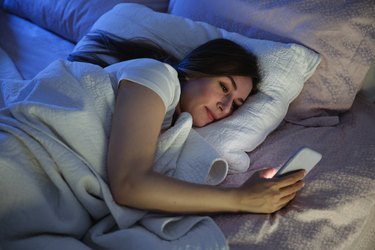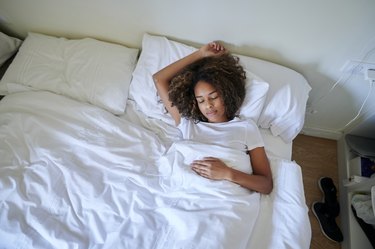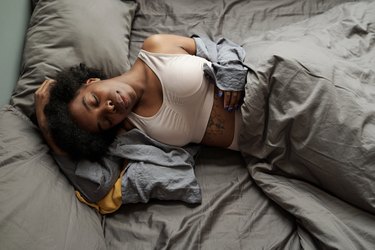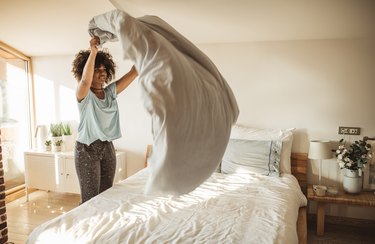
When you're ready to hit the hay, the activities leading up to a good night's sleep can have a real effect on your sleep quality. It's true: Your nighttime habits can make or break how well you sleep.
Sleep quality is affected by your body, mind and the environment, says Jocelyn Cheng, MD, a sleep expert with the American Academy of Sleep Medicine.
Video of the Day
Video of the Day
"Our habits before bedtime can affect any of these by either promoting or interfering with your ability to fall and stay asleep," she says.
Whether you realize it or not, your bedtime routine (or lack thereof) could be keeping you from falling asleep or causing you to wake up too soon.
Here, learn six things Dr. Cheng and other sleep experts avoid before bed in order to get better sleep.
1. They Don't Use Electronics
We're all guilty of indulging in a little pre-bedtime scrolling (hello, revenge bedtime procrastination). Having the entire internet in the palm of your hand is a tough rabbit hole to crawl out of, after all. But it could be detrimental to your sleep quality.
That's because the bright light that comes from our phones, computer screens and TVs (often referred to as blue light, per Harvard Health Publishing) can increase alertness and throw off your circadian rhythm (your body's internal clock), which makes it harder to fall and stay asleep, Dr. Cheng says.
Instead of scrolling on your phone to unwind, she suggests:
- Turning off electronic devices at least 30 minutes before bedtime
- Establishing a relaxing routine to wind down without electronics (like reading a book or doing bedtime yoga)
- Keeping your sleep environment dark (i.e., using blackout curtains or wearing a sleep mask).
All together, these can help signal to your body that it's time to shut down for the day.
2. They Avoid Eating or Drinking Too Much
Eating late at night can also be disruptive when you're ready to get some rest.
"Heavy meals may result in an upset stomach, and drinking large amounts of fluids before bed may make it more difficult to fall or stay sleep because you will increase the need to urinate," Dr. Cheng says.
That doesn't mean you have to go to bed hungry and thirsty if your body needs nutrients, though. Dr. Cheng suggests having a light snack or small amount of water instead.
According to the Cleveland Clinic, some of the best late-night snacks include:
- Raw or steamed vegetables with hummus
- Apple slices with a tablespoon of peanut butter
- Fresh fruit and a small piece of dark chocolate
- Greek yogurt
A light snack is easier to digest and allows you to still fall asleep without a gassy or sour stomach.
3. They Don't Exercise Before Bed
An active lifestyle is something to aspire to, but there's a time and place to get physical. (Spoiler alert: It isn't right before going to bed).
The rush of endorphins you feel after a good workout can be energizing during the day, but it isn't helpful for restful sleep close to bedtime.
Biquan Luo, PhD, scientist and co-founder of LumosTech Sleep Mask, suggests avoiding exercise about two hours before bed (although she notes that it may affect each person differently).
"Some researchers find exercise before bed has no effect on sleep, while others suggest that high-intensity exercise before bed may lead to difficulty falling asleep and poor sleep quality," Luo says.
The Mayo Clinic also advises including exercise in your daily routine but avoiding it too close to bedtime so you aren't overstimulated when you try to hit the sheets.
4. They Cut Off Caffeine
There's a reason so many of us start the day with a cup of coffee or tea. The kick of caffeine is great for a morning or midday energy boost, but if you have it too late in the day, it could keep you up at night.
Caffeine is a stimulant and promotes wakefulness, Dr. Cheng says. So if you feel like you need to drink coffee every day, try drinking it before lunchtime and having no more than 200 milligrams of caffeine per day (or about two cups of home-brewed coffee), she says.
And caffeine isn't just limited to drinks, Luo notes: "I'd also be cautious about the timing and quantity of foods you eat with caffeine that may not seem as obvious, like tiramisu and chocolate."
5. They Avoid Nicotine
Smoking cigarettes or using chewing tobacco comes with many negative effects, including increased risks of cancer, heart disease, lung cancer and other chronic conditions, per the Cleveland Clinic. And it won't do you any favors when it comes to your sleep, either.
"Nicotine is a stimulant that keeps you awake and alert," Luo says. "While using nicotine could relieve anxiety for some people, most of the time, nicotine before bed disrupts your ability to fall asleep, increases nighttime awakening and decreases deep sleep and REM sleep."
If you do use any nicotine products, Dr. Cheng suggests to generally avoid using them after lunchtime to prevent stimulant effects on sleep later in the night.
Tip
The best thing you can do for your sleep and overall health is to quit smoking. To help, try using lozenges or nicotine gum, or join a support group to help you stay on track.
6. They Avoid Drinking Alcohol
Yes, it can be enjoyed in moderation, but drinking alcohol before bedtime also increases the likelihood of a poor night's sleep.
"While alcohol can make you sleepy, its effects on sleep quality after initially falling asleep are offset by premature waking during the night, as well as increased chances of having bad dreams or headaches," Dr. Cheng says.
Along with disrupting sleep patterns, alcohol can also amplify sleep disorders, sleepwalking and breathing problems, per the Cleveland Clinic.
Plus, alcohol is a diuretic (in other words, it makes you pee), meaning it could cause more trips to the bathroom in the middle of the night.
To avoid these potential risks, Dr. Cheng suggests having your last alcoholic beverage at least four to six hours before bedtime.
Was this article helpful?
150 Characters Max
0/150
Thank you for sharing!
Thank you for your feedback!
Is this an emergency? If you are experiencing serious medical symptoms, please see the National Library of Medicine’s list of signs you need emergency medical attention or call 911.


